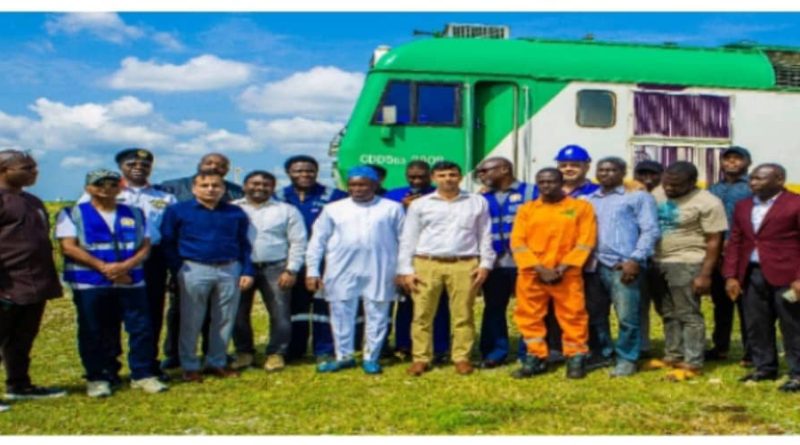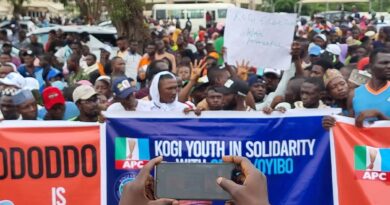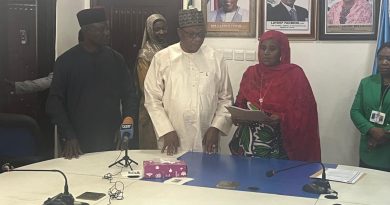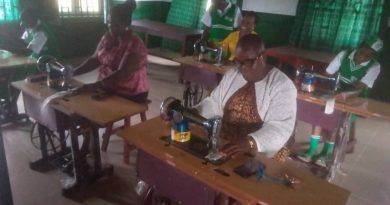Greenville Fuels NRC’s Abuja-Kaduna Train’s Locomotive Engines And Ekeson Transport’s LNG-Powered Luxury Buses With LNG In Lagos And Abuja
….As Host Community leaders and Senior Law Enforcement Officers pay courtesy visit to Greenville LNG’s Gas Plant in Rumuji Rivers State
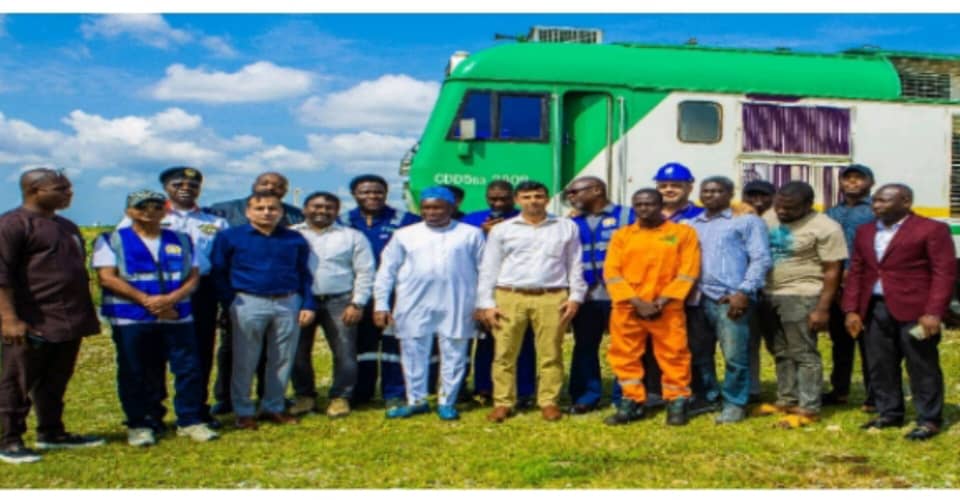
Greenville LNG’s Head of Commercial, Mr Amit Singh (5th from right) with the Chairman of De-Sadel Consortium Mr Samuel Uko and other officials of Greenville LNG and the Nigerian Railway Corporation during the historic LNG-fuelling event at the NRC Station in Idu Abuja FCT recently
At different pioneering and exciting energy transition events in the Nigerian transportation sector, Greenville LNG, Nigeria’s flagship Domestic Gas Infrastructure development and gas distribution company, commenced the fuelling of Nigerian Railway Corporation’s Abuja-Kaduna Trains retrofitted locomotive engines with LNG. Greenville LNG also commenced fuelling of Ekeson transport’s Liquefied Natural Gas (LNG)-powered luxury buses in Lagos.
Greenville LNG was at the Idu Abuja Railway Station to, for the second time, fuel for a test drive of the newly retrofitted LNG-powered trains. This initiative is part of NRC’s ongoing energy transition to LNG, with the locomotives retrofitted with LNG kits by De-Sadel Consortium.
During the first locomotive engine fueling with LNG by Greenville LNG at the Idu Abuja Nigeria Railway Corporation (NRC) Station, Greenville LNG Company Limited was represented by its General Manager of LNG-CNG Retailing, Gokul Moothedathu, Head of Commercial Amit Singh, amongst others. There were also several senior NRC officials on ground during the historic event in Idu Abuja FCT.
The second LNG fueling of the NRC locomotives event saw the attendance of notable stakeholders and invited guests. Both test drives were successfully conducted with passengers on board. The partnership between Greenville LNG and NRC focuses on the supply of LNG for the retrofitted trains.
The LNG-powered test drives of the NRC trains included successful stops at both Kubwa Abuja FCT and in Kaduna State, demonstrating the effectiveness of the transition of NRC’s train-powering energy source to LNG.
The initiative represents a significant advancement in Nigeria’s efforts to embrace and promote sustainable energy solutions and significantly reduce environmental pollution as well as operational costs. In a post-event interview, Mr. Samuel Uko emphasized that this conversion aligns with Nigeria’s Gas Initiative Vision, with the potential to reduce operational costs by about 70%. This project signifies the beginning of a long-term, mutually beneficial partnership between Greenville LNG and the NRC, and targets to reshape the future of railway transportation in Nigeria.
Meanwhile, the Ekeson Transport’s LNG buses were fuelled with LNG at the company’s station located in Lagos. Greenville LNG was represented by the company’s Zonal Manager Retail South, Shantanu Mishra and Engr Chijioke, Managing Director of Ekeson Transport was also present during the fueling.
It would be recalled that it was earlier reported in March this year that “the Federal Government, through the Minister of Transportation, Said Alkali, has initiated a move to transition Nigerian Railway Corporation locomotives from diesel to liquefied natural gas and compressed natural gas in a bid to steer the corporation towards sustainable energy sources and reduce operational costs.” The Honourable Minister had reiterated the desire of President Bola Ahmed Tinubu’s administration to provide Nigerians with efficient, affordable, and sustainable transportation given the strategically necessary removal of subsidy on fuel by the Government.
Earlier in March this year, a team of technical experts presented a proposal for joint deliberation by the Ministry of Transportation and the NRC at the Ministry’s headquarters with a view to retrofitting NRC’s locomotives with LNG-CNG technology. The Honourable Minister of Transportation had expressed optimism that the transition to LNG-CNG alternative could produce more effective, efficient, and logically cheaper rail services for Nigerians. “It is the desire of our President, Bola Ahmed Tinubu, to provide an efficient, affordable, and sustainable transportation system for the people of this great country and I am sure this would go a long way in bringing down the cost of transportation,”
Transportation Minister Alkali reportedly said.
The Ministerial Committee eventually set up on the feasibility of LNG power option for the rail locomotive engines, confirmed the technical viability of retrofitting NRC’s locomotives with LNG-CNG technology. Key findings of the Ministerial Committee included that the use of LNG would lead to better cost efficiency as well as enhanced and extended locomotive engine lifespan.
It was therefore a historic moment for Greenville LNG Co. Ltd and, indeed, for Nigeria when the company fueled the Nigerian Railway Corporation locomotive engines for the first and subsequent times in the operational history of the corporation for momentous test drives on the Abuja-Kaduna Rail line, recently. In the words of the General Manager, LNG-CNG Retailing of the company, Gokul Moothedathu, “Greenville LNG as with best global practice, is in business to proactively operate for a most efficient, effective, and affordable energy renaissance, and for a great transition to a cleaner, more ecofriendly future that guarantees a healthy and sustainable environment for generations to come in Nigeria.”
In another positive development, senior operational security and law enforcement officers have paid a familiarisation visit on the Greenville LNG Gas Plant in Rumuji. All the Divisional Police officers of Emohua, Rumuji, and Ahoada accompanied the Area Commander, ACP Cecy Brown on the familiarization visit. During the visit, led by the Area Commander, Ahoada, Rivers State Command of the Nigerian Police Force, the need for peaceful cooperation between the company and its stakeholders and communities was mutually emphasised.

